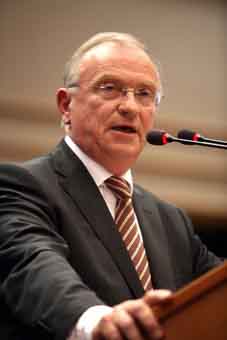PACE adopts resolution on Georgian-Russian conflict
By Temuri Kiguradze
Thursday, April 30

“We can’t agree with Russia keeping its military forces in the region,” stated Co-Reporter on Russia Luc Van den Brande. He added that “the sides should stop further militarization.” The information report on the situation in the conflict zones presented to the assembly noted that “Georgia has not fully complied” with the previous PACE resolution, however Russia “has failed to comply with most of the key demands of the Assembly.” Furthermore, “Russia could even be seen to be moving further away from the minimum conditions for meaningful dialogue as mentioned in the abovementioned Resolutions, as well as in terms of providing an improved security situation in the region.”
Speaking at the session fellow PACE Reporter Matyas Eorsi said that the Russian attack on South Ossetia had “changed the world order.” Other delegates emphasized that the Kremlin had been carrying out an aggressive policy even before the August events, and now not only the Caucasus, but also the Baltics, Ukraine and Moldova face a serious danger. Luc van den Brande and Matyas Eorsi said in their concluding joint statement that, “We continue to be convinced that the establishment of a genuine dialogue is the only way forward for the resolution of this conflict and the long-term stability of the region.”
The Russian and Georgian delegations conducted a three-hour bilateral debate on April 29 as well. “The Russian Government tries to not only disrespect the resolutions which were democratically adopted by a forum of which it is a prominent member, but to also not honour the agreements between the sides. All of these documents are based on serious fundamental issues, which are extremely important for removing the mutual distrust which exists between the two sides of the recent conflict and beginning the process of political dialogue and the normalization of the relationship. None of these key concerns have been met or even considered by Russia,” Petre Tsiskarishvili, the head of the Georgian delegation to PACE, said after the debate.
Konstantin Kosachev, the head of the Russian delegation, stated that Georgia had “not fulfilled the obligations it took upon itself when becoming a member of this organization. One of the main issues was resolving the Abkhazia and South Ossetia conflicts peacefully, but Georgia violated this obligation on August 8, 2008.” Kosachev thinks the assembly should make a “proper assessment” of this.
Georgian political experts are not optimistic about the PACE session producing any results, however most of them welcome the support for Georgia expressed by the European Community. “PACE is not the kind of organization which can make Russia revise its decision in Georgia. The Assembly hasn’t even imposed any sanctions on Moscow, so this resolution will be just words on paper as before,” Georgian political expert Paata Zakareishvili told The Messenger on April 29.
Fellow analyst Giorgi Khutsishvili agrees, saying that PACE has “no power to put pressure on Russia,” however he considers that the PACE statements in support of Georgian territorial integrity are part of a European policy which is being applied in the South Caucasus. “There are many reasons for that [the West’s interest in the Caucasus], one of them being the NABUCCO pipeline which will pass through the territory of Georgia and another is the worsening situation in Afghanistan. The Caucasian countries may provide a corridor for the support of operations there,” considers Khutsishvili.
Today’s PACE session was the third to discuss the Russian-Georgian conflict in August 2008. Two previous resolutions demanded that Russia withdraw its forces from the Georgian separatist regions of Abkhazia and South Ossetia and rescind the decision to recognise them as ‘independent states’, however these resolution were ignored by the Kremlin.
